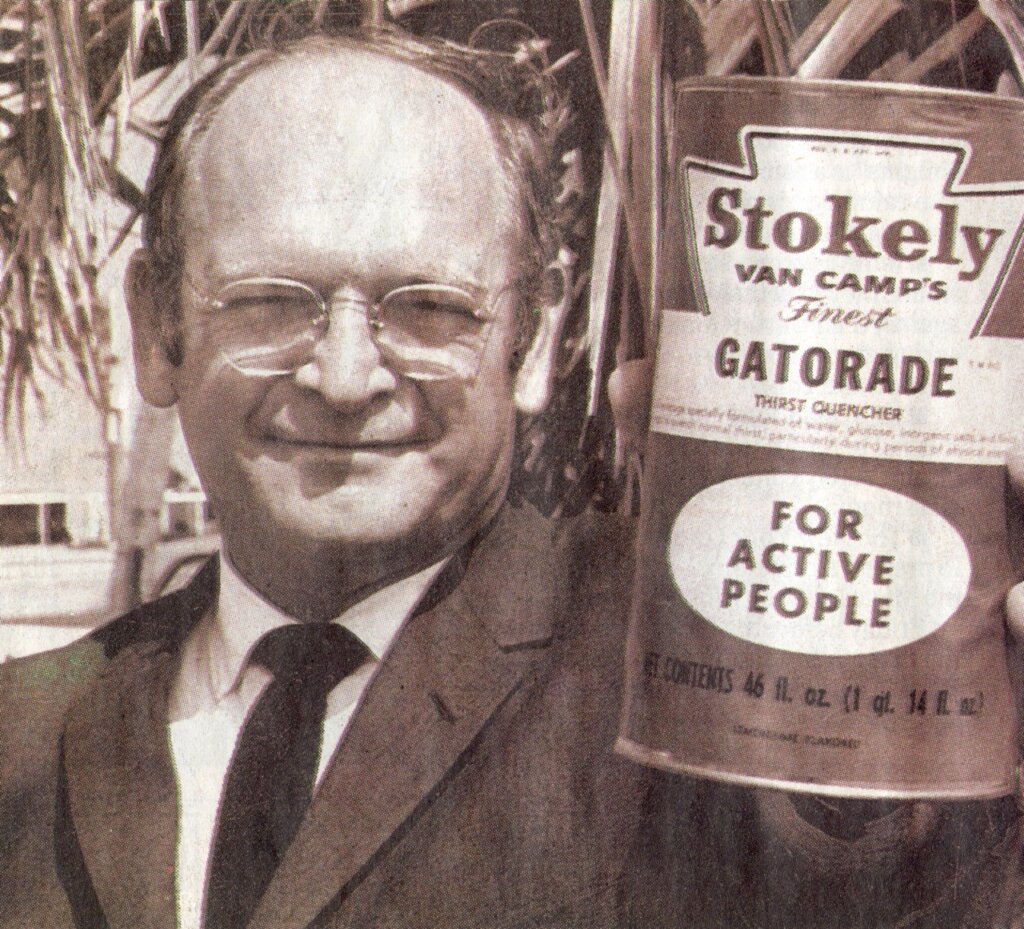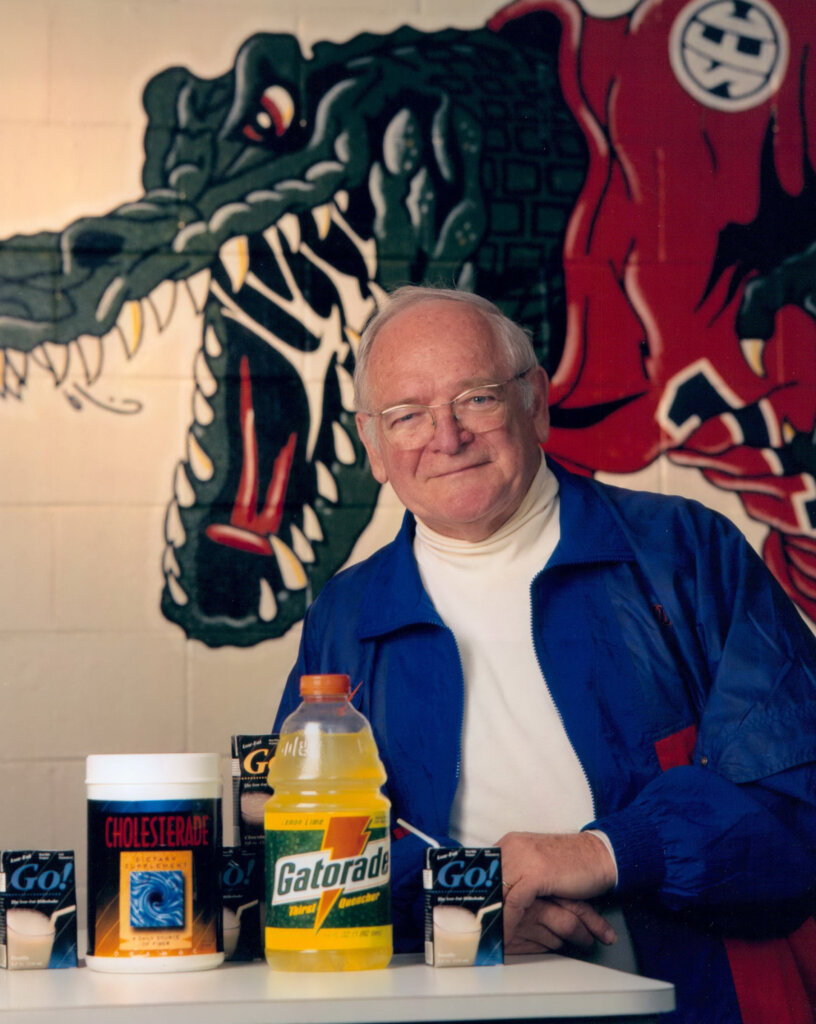
2024 News
Innovator Spotlight: Dr. Robert Cade – Inventor of Gatorade and Shaper of the American Patent Law
Celebrating the Groundbreakers: Inaugural Class of The Florida Inventors Hall of Fame (2014)
February 29, 2024
By Lauren Parker
In our latest interview, we had the privilege of speaking with Phoebe Cade Miles, daughter of the renowned inventor Dr. Robert Cade, who revolutionized the sports world with the creation of Gatorade. Phoebe, herself a prominent figure in innovation and education, shared with us the fascinating story behind Gatorade and her father’s impactful legacy.
The Genesis of Gatorade:
Phoebe enlightened us on the genesis of Gatorade, tracing its roots to her father’s tenure at the University of Florida’s College of Medicine. Dr. Cade, a pioneer in renal medicine, was approached to establish the Division of Renal Medicine at Shand’s Hospital, which was affiliated with the newly established College of Medicine. Amidst his groundbreaking work in kidney research, a serendipitous conversation between Dr. Cade and an assistant football coach at the hospital’s coffee sessions sparked the idea for Gatorade. The coach’s report about players suffering from heat-related illnesses during games led Dr. Cade to recognize the correlation between electrolyte imbalance and dehydration, ultimately laying the groundwork for the development of Gatorade.

The Journey of Innovation:
It was after Dr. Cade meticulously analyzed collected sweat and blood samples, that he gained profound insights into the physiological effects of dehydration. His rigorous scientific experiment revealed the critical role of sodium loss in regulating body temperature. Inspired with this knowledge, he developed an innovative solution: a drink formulated to replenish lost fluids and electrolytes efficiently. With precision and scientific rigor, he crafted an osmotically balanced beverage designed to pass through the intestine and rehydrate the body effectively. This groundbreaking creation marked the birth of Gatorade. However, when the freshman team tasted the concoction, they found it unpalatable and refused to drink it. Despite Phoebe’s father’s dedication, this setback left him disheartened. However, Phoebe revealed that her mother, who was neither an inventor nor a scientist herself, suggested adding lemon to improve the taste. With her idea in mind, Dr. Cade squeezed fresh lemon into the mixture and presented it again the following day. Although it still wasn’t perfect, it became drinkable. In a pivotal scrimmage between the freshman and Varsity B teams, dubbed the ‘Toilet Bowl,’ the hydrated freshmen made history by winning for the first time in Gator history. This success prompted Coach Ray Graves to introduce the drink the following weekend for the upcoming LSU game. It was during this monumental game where the Gators, considered underdogs, emerged victorious in a stunning upset. Notably, the entire team, including legendary player Steve Spurrier, embraced Gatorade during the game.
Shaping American Patent Law:
Diving deeper into our conversation together, Phoebe shared fascinating insights into the development of Gatorade and its impact on American patent law. As Phoebe explained, the main challenge didn’t lie in the initial creation of Gatorade, although there were hurdles such as taste issues and a shortage of glucose, the real challenge surfaced afterwards, raising a profound question: who truly owns an idea? This question delves into the fundamental principles of patent law in the United States, dating back to its inception in 1790. Patent law was a revolutionary aspect of our nation’s founding, emphasizing the right for inventors to own their intellectual property. For the first 150 years, patent law primarily focused on individual inventors. However, Gatorade presented a unique scenario as it emerged from publicly funded research at a public institution. This raised complex legal disputes, with both the federal government and the University of Florida claiming ownership rights. Despite facing legal challenges, Gatorade’s inventors navigated through the legal complexities and made significant contributions to patent law and innovation.
A Legacy of Innovation and Education:
Reflecting on her father’s inspiring story, Phoebe emphasized the broader implications of Gatorade beyond its commercial success. She underscored the pivotal role of Gatorade in shaping American patent law, serving as a catalyst for reform and setting a precedent for collaborative research ventures between universities and corporations. Phoebe’s commitment to continuing her father’s legacy extends beyond Gatorade, as evidenced by her visionary leadership at the Cade Museum for Creativity & Invention in Gainesville, Florida. Through innovative education initiatives and inventive exhibits, she strives to cultivate a culture of curiosity and creativity, empowering individuals of every background to embrace their inventive potential, a mindset she and the Cade Museum call Inventivity®.

In closing, Phoebe shared her father’s humble demeanor and unwavering dedication to problem-solving, emphasizing his legacy as a testament to the transformative power of innovation. As we celebrate Dr. Robert Cade’s induction into the Florida Inventors Hall of Fame in 2014, we are reminded of his remarkable contributions to science, sports, and society, leaving an indelible mark on the world of invention.
